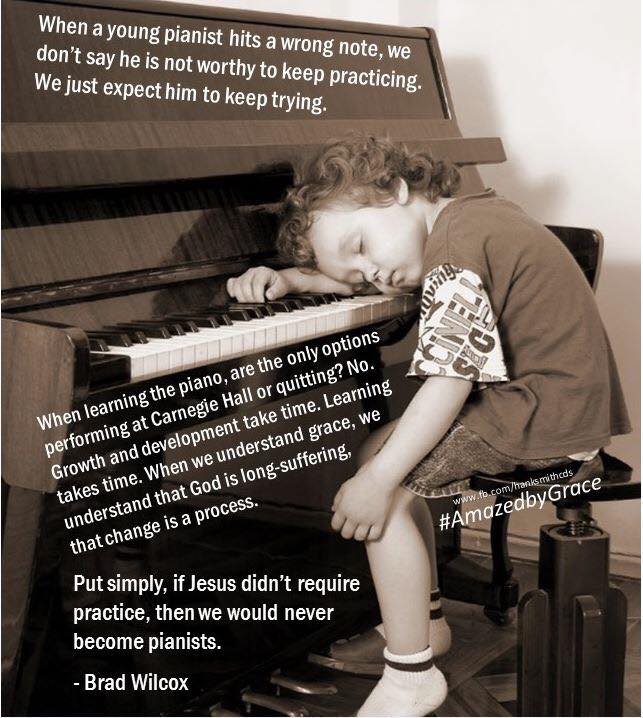
My good friend, Brad Wilcox, once made a beautiful analogy of how grace can be a powerful force for change in our lives. Here it is in his words:
Christ’s arrangement with us is similar to a mom providing music lessons for her child. Mom pays the piano teacher. How many know what I am talking about? Because Mom pays the debt in full, she can turn to her child and ask for something. What is it? Practice! Does the child’s practice pay the piano teacher? No. Does the child’s practice repay Mom for paying the piano teacher? No. Practicing is how the child shows appreciation for Mom’s incredible gift. It is how he takes advantage of the amazing opportunity Mom is giving him to live his life at a higher level. Mom’s joy is found not in getting repaid but in seeing her gift used—seeing her child improve. And so she continues to call for practice, practice, practice.
The child must practice the piano, but this practice has a different purpose than punishment or payment. Its purpose is change.
“But Brother Wilcox, don’t you realize how hard it is to practice? I’m just not very good at the piano. I hit a lot of wrong notes. It takes me forever to get it right.” Now wait. Isn’t that all part of the learning process? When a young pianist hits a wrong note, we don’t say he is not worthy to keep practicing. We don’t expect him to be flawless. We just expect him to keep trying. Perfection may be his ultimate goal, but for now we can be content with progress in the right direction. Why is this perspective so easy to see in the context of learning piano but so hard to see in the context of learning heaven?
Too many are giving up…because they are tired of constantly feeling like they are falling short. They have tried in the past, but they always feel like they are just not good enough. They don’t understand grace.
There should never be just two options: perfection or giving up. When learning the piano, are the only options performing at Carnegie Hall or quitting? No. Growth and development take time. Learning takes time. When we understand grace, we understand that God is long-suffering, that change is a process, and that repentance is a pattern in our lives. When we understand grace, we understand that the blessings of Christ’s Atonement are continuous.
Grace isn’t just about being saved. It is also about becoming like the Savior.
The miracle of the Atonement is not just that we can be cleansed and consoled but that we can be transformed.
The miracle of the Atonement is not just that we can go home but that—miraculously—we can feel at home there.
Put simply, if Jesus didn’t require practice, then we would never become pianists.
Brad Wilcox